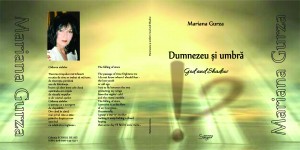Ștefan Doru Dăncuș – De ce Mariana Gurza? / Why Mariana Gurza?
De ce Mariana Gurza?
La o primă vedere, s-ar putea spune despre poezia Marianei Gurza că este de un ermetism pe care mulţi cititori nu l-ar înţelege. Deh, e mult mai uşor să priveşti poezia de azi prin prisma textu-alismului – dar dincolo de aparenta închistare lingvistică explodează versuri neobişnuit de pro-funde; poate în asta stă şi coeficientul de ermetism pe care nu-l neg, doar îl observ (ca parte, nu ca întreg).
Încerc să definesc global maniera scrisului Marianei Gurza, nu să mă raportez la valenţele unui singur volum, astfel că pot opina: aura profe-sorală ca primă senzaţie, când îi citeşti poemele aproape că dispare, dacă te laşi purtat de versuri, fără intenţii critice imediate. Ce şi-ar putea dori mai mult un poet, decât să trezească emoţia în po-tenţialul cititor?, căci trăim într-o lume în care sentimentul este, după tot mai desele păreri, mult mai uşor de generat pe calculator decât trăit pe viu, la intensitatea generată de fiinţa umană. E drept că actualele resurse tehnologice îndepărtează omul de propria sa expresivitate, îndepărtându-l astfel de partea lui artistică – dar tot drept este că poezia contemporană s-a transformat într-un fel de „bun” ce poate fi vândut ori cumpărat precum o roată de maşină, ca să dau un exemplu. Şi-atunci cum să convingi pe cineva că arta este necesară?
Tot felul de filme şi informaţii mass media spun lumii că arta se măsoară în cotaţii ale caselor de licitaţii, că e valoros numai ce costă mulţi bani, ignorându-se (voit sau din neştiinţă) rostul ei pri-mordial, acela de a ne răscoli fiinţa în alt sens decât cel material.
Prin poezia sa, Mariana Gurza opune curajos latura spirituală celei materiale, „realizării” facile prin materialul/financiarul acestor timpuri dezaxate. De vom privi şi partea spirituală – depin-de doar de noi. De nu, putem spune ca Nietzsche: „Dacă te uiţi adânc în neant, şi neantul se uită la tine”.
Ştefan Doru Dăncuş
Why Mariana Gurza?
At a first glance, of Mariana Gurza’s poetry one might say that it is of an hermeticism which many readers would not understand. Aye, it’s much easier to look at today’s poetry through the prism of textualism – but unusually profound poetic lines explode beyond the apparent linguistic seclusion. Perhaps in this resides the factor of hermetism which I do not deny but simply observe (as a part rather than as a whole).
I attempt to define the manner of Mariana Gurza’s writing globally instead of referring to the valencies of a single volume, therefore I can opine: although an initial perception when you read the poems, the professorial aura nearly disappears if you let yourself be carried away by the lines with no immediate critical intentions. What could a poet wish for but to emotionally stir the potential reader?, because we live in a world where the sentiment is – according to increasingly common opinions – much easier to be generated on the computer than living lively, at the intensity generated by human beings. It cannot be denied that current technological resources remove the human being from its own poetic expression, thus removing him or her from their artistic side. But it is equally valid that contemporary poetry has been turned into a type of commodity that can be sold or bought as a car wheel, for the sake of giving an example. How could you then possibly convince someone that art is indispensable?
Various films and media information present art to the world as if it were measurable in the quotas of auction houses, as if it were valuable only when costing a lot of money, and they ignore (willingly or ignorantly) its primordial purpose, that of stirring our being in another manner than the worldly one.
Through her poetry, Mariana Gurza courageously opposes the spiritual side to the materialistic one, to the facile “achievement” by materialistic and monetary means of our contemporary world lacking an axis. Should we also consider the spiritual side, that depends only on us. Should we not, we can state like Nietzsche: “If you gaze long into an abyss, the abyss also gazes into you.”
Ştefan Doru Dăncuş
(Din vol. Dumnezeu și umbră/God and shadow, Editura SINGUR, Colecția SCRISUL DE AZI, 2016)

